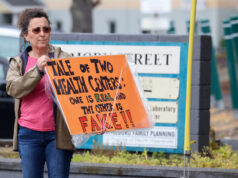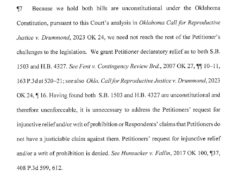
Careful what you throw in your trash. It’s not just journalists, private investigators or Slippin’ Jimmy McGill digging through dumpsters these days.
ProPublica senior reporter Charles Ornstein recently dove into the issue of anti-abortion advocates “using garbage as their ammunition.”
They claim it’s the clinics that are violating patients’ privacy by discarding medical records in unsecured ways.
“Everybody acts like the abortion clinics are this bastion of protection for women’s privacy, and they’re like the chief offenders of just dumping this stuff willy-nilly,” said Cheryl Sullenger, senior policy advisor at Operation Rescue, an anti-abortion group based in Wichita, Kansas. “It’s so hypocritical.”
Abortion rights groups counter that while a small number of clinics have improperly disposed of records, the vast majority take strict precautions to protect patient privacy. It’s far more common, they say, for abortion opponents to trespass on private property or try to break into locked dumpsters.
The story is part of ProPublica’s Policing Patient Privacy series, and it talks about Oklahoma City abortion doctor Nareshkumar Gandalal Patel who received significant reprimand by the Oklahoma State Board of Medical Licensure and Supervision for record-keeping violations.
Patel is still licensed in Oklahoma, but agreed not to practice medicine as of Dec. 29, 2014. Patel’s reprimand came after he provided abortion-inducing drugs to three undercover agents who were not actually pregnant.
But the investigation began after a complaint was filed with the Oklahoma Attorney General’s Office by an anti-abortion advocacy group called Operation Rescue.
Operation Rescue said an anonymous source provided them with “documents (that) were discarded in an unsecured, publicly accessible garbage bin, in a shared parking lot with other businesses.”
Federal health information rules (HIPAA) require any medical documents featuring protected health information (PHI) to be burned, shredded or recycled by a registered agency.
I found this interesting because I’ve been on both sides of this situation. (And, no, I don’t mean abortion.)
On the one hand, I have worked in health care for an organization whose in-house attorney regularly badgered us with HIPPA-requirement reminders and seminars, ensuring that we understood any physical PHI had to be shredded or disposed of in a designated bin owned by a local shredding company.
My point? It surprises me that a doctor — and his staff — in a highly-scrutinized field would throw enough PHI into a dumpster so as to alert state officials to other office violations. For only a couple hundred dollars a month or less, I know first-hand that professional document-disposal companies will haul away said documents.
There are a lot of weird doctors out there, though.
Still, there are even weirder people who will dig through trash for information. Like me!
I will never forget the time a reputable journalist at the University of Oklahoma showed me how, at a certain time each night, one could stand in the shadows of Evans Hall and watch a cleaning woman take trash from high-level administrators’ offices and toss it into a crimson dumpster.
I did this exactly once and felt disgusting, both morally and hygienically.
So check out Mr. Ornstein’s full article, and if you ever decide to go dumpster diving behind a medical clinic, take a clothespin for your nose.
And watch out for needle sticks.





















